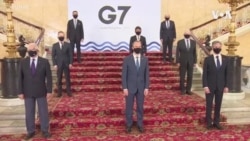ບັນດາລັດຖະມົນຕີຂອງກຸ່ມ 7 ປະເທດທີ່ຈະເລີນທາງດ້ານອຸດສາຫະກຳ ຫຼື G7 ໄດ້ຈັດກອງປະຊຸມໃນນະຄອນຫຼວງລອນດອນຂອງ ອັງກິດ ໃນອາທິດນີ້, ໂດຍມີ ສະພາບອາກາດປ່ຽນແປງ, ຣັດເຊຍ ແລະ ຈີນ ໄດ້ລວມຢູ່ໃນຫົວຂໍ້ສຳລັບການສົນທະນາ. ນັກຂ່າວວີໂອເອ ເຮັນຣີ ຣິຈ໌ແວລ ມີລາຍງານ ຈາກນະຄອນຫຼວງ ລອນດອນ, ເຊິ່ງ ພຸດທະສອນ ຈະນຳລາຍລະອຽດມາສະເໜີທ່ານໃນອັນດັບຕໍ່ໄປ.
ໃນການພົບປະໜ້າຕໍ່ໜ້າຄັ້ງທຳອິດໃນຮອບສອງປີ, ບັນດາລັດຖະມົນຕີ G7 ຍັງຄົງຢູ່ຫ່າງກັນໃນສັງຄົມໃນຂະນະທີ່ພວກເພິ່ນພົບປະກັນໃນນະຄອນຫຼວງ ລອນດອນ ເມື່ອວັນອັງຄານທີ່ຜ່ານມາ.
ມັນມີວາລະແຜນການເຕັມສຳລັບກອງປະຊຸມສຸດຍອດສອງວັນນັ້ນ, ລວມທັງສາຍພົວພັນຂອງ G7 ກັບປະເທດ ຣັດເຊຍ, ເຊິ່ງໄດ້ຖືກປົດອອກຈາກກຸ່ມຫຼັງຈາກເຂົ້າໄດ້ເຂົ້າຄວບຄຸມແຫຼມ ໄຄຣເມຍ ໃນປີ 2014.
ບັນດາລັດຖະມົນຕີ G7 ໄດ້ກ່າວປະນາມການສົ່ງກຳລັງທະຫານຂອງ ມົສກູ ໄປເຂດຊາຍແດນຂອງ ຢູເຄຣນ ເມື່ອບໍ່ດົນມານີ້.
ທ່ານ ແອນໂທນີ ບລິງເຄັນ ລັດຖະມົນຕີການຕ່າງປະເທດ ສະຫະລັດ ໄດ້ກ່າວວ່າ “ຖ້າ ຣັດເຊຍ ເລືອກທີ່ຈະດຳເນີນການຢ່າງບໍ່ລະມັດລະວັງ ແລະ ຢ່າງຮຸນແຮງນັ້ນ, ພວກເຮົາຈະຕອບໂຕ້ຄືນ. ແຕ່ພວກເຮົາບໍ່ໄດ້ຫວັງທີ່ຈະເຮັດໃຫ້ມັນຮຸນແຮງຂຶ້ນ. ພວກເຮົາເລືອກທີ່ຈະມີສາຍພົວພັນທີ່ໝັ້ນຄົງ ແລະ ສາມາດທຳນາຍໄດ້ຫຼາຍກວ່າ.”
ຈີນ ກໍໄດ້ເປັນຫົວຂໍ້ທີ່ສຳຄັນສຸດໃນວາລະກອງຊຸມເຊັ່ນກັນ.
ທ່ານ ແອນໂທນີ ບລິງເຄັນ ໄດ້ກ່າວວ່າ “ມັນບໍ່ແມ່ນຈຸດປະສົງຂອງພວກເຮົາທີ່ຈະພະຍາຍາມຄວບ ຄຸມ ຈີນ ຫຼື ກົດເນັ່ນ ຈີນ ໄວ້. ສິ່ງທີ່ພວກເຮົາພະຍາຍາມເຮັດກໍແມ່ນສະໜັບສະໜູນກົດລະບຽບທີ່ອີງໃສ່ກົດເກນຂອງສາກົນ.”
ສື່ມວນຊົນລັດຖະບານ ຈີນ ໄດ້ກ່າວຫາ ສະຫະລັດ ໃນວັນອັງຄານທີ່ຜ່ານມາໃນຄຳເວົ້າຂອງເຂົາ ເຈົ້າເອງວ່າ “ຕັ້ງໃຈຂະຫຍາຍສິ່ງທີ່ເອີ້ນວ່າ “ການຂົ່ມຂູ່ ຈີນ.”
ກຸ່ມ 7 ປະເທດ ໄດ້ສະໜັບສະໜູນຫຼັກເກນທີ່ຖືກຕັ້ງຂຶ້ນມາໃນການກໍ່ຕັ້ງຂອງເຂົາເຈົ້າເມື່ອປີ 1975, ອີງຕາມການກ່າວຂອງນັກວິເຄາະ ທ່ານ ຈອນ ເຄີຕັນ.
ທ່ານ ຈອນ ເຄີຕັນ, ຈາກກຸ່ມຄົ້ນຄວ້າ G7 ຢູ່ມະຫາວິທະຍາໄລ ໂຕຣອນໂຕ ປະເທດ ການາດາ ໄດ້ກ່າວວ່າ “ເພື່ອການປົກປ້ອງພາຍໃນກຸ່ມສະມາຊິກຂອງ ເຂົາເຈົ້າເອງ ແລະ ການສົ່ງເສີມໃນທົ່ວ ໂລກ, ກ່ຽວກັບ ຄຸນຄ່າຂອງປະຊາທິປະໄຕທີ່ເປີດກວ້າງ ແລະ ເສລີພາບຂອງບຸກຄົນ. ເຂົາເຈົ້າໄດ້ຖືກຂົ່ມຂູ່ຂ້ອນຂ້າງຫຼາຍໂດຍການຂະຫຍາຍຕົວຂອງ ຣັດເຊຍ ໃນປີ 1975. ແລະ ເຂົາເຈົ້າ ຍັງຖືກຂົ່ມຂູ່ໂດຍ ຣັດເຊຍ ໃນທຸກມື້ນີ້, ແຕ່ເຊັ່ນດຽວກັບ ຈີນ ແລະ ລະບອບການປົກຄອງຜະເດັດການອື່ນໆ.”
ອັງກິດ ຍັງໄດ້ເຊື້ອເຊີນລັດຖະມົນຕີການຕ່າງປະເທດຈາກ ອອສເຕຣເລຍ, ອິນເດຍ, ອາຟຣິກາໃຕ້ ແລະ ເກົາຫຼີໃຕ້ ເພື່ອການເຈລະຈາ, ເປັນການສະແດງໃຫ້ເຫັນຈຸດເພັ່ງເລັງຂອງ ລອນດອນ ກ່ຽວ ກັບພາກພື້ນ ອິນໂດປາຊີຟິກ.
ທ່ານ ຈອນ ເຄີຕັນ ໄດ້ກ່າວວ່າ “ສະນັ້ນ, ສິ່ງທີ່ພວກເຮົາກຳລັງເຫັນແມ່ນການເກີດຂຶ້ນຂອງຄອບ ຄົວປະຊາທິປະໄຕທີ່ກວ້າງຂວາງກວ່າເກົ່າ. ແລະ ຖ້າເຂົາເຈົ້າຍິນດີທີ່ຈະເອົາຊື່ປະເທດຂອງພວກເຂົາລົງໃສ່ເຈ້ຍພ້ອມກັບປະເທດປະຊາທິປະໄຕ 7 ປະເທດ, ເຊິ່ງແມ່ນກຸ່ມ 7 ປະເທດເອງນັ້ນ, ມັນກໍຈະເປັນສັນຍານທີ່ມີພະລັງກວ່າແຕ່ກ່ອນຫຼາຍ.”
ບັນດາລັດຖະມົນຕີຕ່າງປະເທດ G7 ຍັງໄດ້ປຶກສາຫາລື ກ່ຽວກັບ ການຕອບໂຕ້ຮ່ວມກັນຕໍ່ການກໍ່ລັດຖະປະຫານທະຫານໃນ ມຽນມາ ແລະ ການປາບປາມທີ່ຮຸນແຮງຕໍ່ການປະທ້ວງສະໜັບສະໜູນປະຊາທິປະໄຕ
ແລະ ສະຫະລັດ ກັບ ອົງການ NATO ຖອນຕົວອອກຈາກ ອັຟການິສຖານ, ເຊິ່ງໄດ້ເລີ່ມຂຶ້ນໃນເດືອນນີ້.
ທ່ານ ໂດມີນິກ ຣາບ, ລັດຖະມົນຕີການຕ່າງປະເທດ ອັງກິດ ໄດ້ກ່າວວ່າ “ເພື່ອຮັບປະກັນວ່າພວກເຮົາຮັກສາຄວາມສາມາດທີ່ຈະຮັບມືກັບການປາບປາມລັດທິກໍ່ການຮ້າຍນັ້ນ, ຜົນປະໂຫຍດທີ່ພວກເຮົາໄດ້ຊະນະໃນ ອັຟການິສຖານ ແມ່ນຈະບໍ່ສູນເສຍໄປ ແລະ ຍັງໄດ້ສົ່ງເສີມໃຫ້ເກີດການປຶກສາຫາລືຂຶ້ນໃນທີ່ສຸດ ແລະ ຂະບວນການສັນຕິພາບທີ່ເປັນປະໂຫຍດຕໍ່ຊາວ ອັຟການິສຖານ ໝົດທຸກຄົນ.”
ໃນຂະນະດຽວກັນ, ບັນດາພວກປຸກລະດົມໄດ້ຮຽກຮ້ອງກຸ່ມ 7 ປະເທດໃຫ້ ຮັບປະກັນວ່າ ບັນດາປະເທດທີ່ທຸກຍາກກວ່າ ຈະໄດ້ເຂົ້າເຖິງຢາວັກຊີນໄວຣັສໂຄໂຣນາ. ອົງການສະຫະປະຊາຊາດກ່າວວ່າ ເກືອບ 90 ເປີເຊັນຂອງຢາວັກຊີນທີ່ຖືກສັກໃນທົ່ວໂລກແມ່ນໄດ້ເກີດຂຶ້ນໃນປະເທດທີ່ຮັ່ງມີ.
ການຕອບໂຕ້ຕໍ່ໂຣກລະບາດຈະເປັນຈຸດເພັ່ງເລັງ ເວລາທີ່ ອັງກິດ ເປັນເຈົ້າ ພາບກອງປະຊຸມສຸດຍອດຂອງບັນດາຜູ້ນຳ G7, ເຊິ່ງມີກຳນົດຈະເປັນການເດີນທາງໄປຕ່າງປະເທດຄັ້ງທຳອິດຂອງ ທ່ານ ໂຈ ໄບເດັນ ໃນຖານະເປັນປະທານາທິບໍດີ ສະຫະລັດ.
Foreign ministers of the G-7 group of industrialized nations are meeting in London this week – with climate change, Russia and China among the topics up for discussion. Henry Ridgwell reports from London.
Face-to-face for the first time in two years – G-7 foreign ministers remained socially distanced as they met in London Tuesday.
There is a full agenda for the two-day summit - including the G-7’s relations with Russia, which was ejected from the group after its forceful annexation of Crimea in 2014.
G-7 ministers condemned Moscow’s recent deployment of troops on Ukraine’s border.
“If Russia chooses to act recklessly or aggressively, we'll respond. But we are not looking to escalate. We would prefer to have a more stable, more predictable relationship.”
China is also high on the agenda.
“It is not our purpose to try to contain China or to hold China down. What we are trying to do is to uphold the international rules-based order.”
Chinese state media accused the United States Tuesday of - in its words - ‘deliberately hyping up the so-called ‘China threat.’
The G-7 is upholding the principles enshrined at its foundation in 1975, says analyst John Kirton.
“To protect within its own members, and promote globally, the values of open democracy and individual liberty. They were very much threatened by an expanding Russia above all in 1975. And they’re still threatened by Russia today, but also China and other authoritarian regimes.”
Britain also invited foreign ministers from Australia, India, South Africa and South Korea to the talks – a demonstration of London’s focus on the Indo-Pacific region.
“So, what we are seeing is the birth of a broader democratic family. And if they’re willing to put their countries’ names on paper alongside the democratic seven, the G-7 itself, that will be an even more powerful signal.”
G-7 foreign ministers also discussed a coordinated response to the military coup in Myanmar and the violent crackdown on pro-democracy protests…
…and the U.S. and NATO pull-out from Afghanistan, which began this month.
“Making sure that we preserve the ability to deal with counterterrorism, that the gains that were hard won in Afghanistan are not lost and also ultimately promoting dialogue and a peace process that benefits all Afghans.”
Meanwhile, campaigners are calling on the G-7 to ensure that poorer countries get access to coronavirus vaccines. The United Nations says close to 90% of all vaccines administered worldwide have gone to richer nations.
The response to the pandemic will be a focus when Britain hosts the G-7 leaders’ summit in June - set to be Joe Biden’s first overseas visit as U.S. president.





